C. C. Moore (13-02-1830 - ?) American composer
This author is quoted in American Chess-Nuts (1868), for instance:
Moore, C. C.
American Chess-Nuts, 1868 (3-moves / 623)
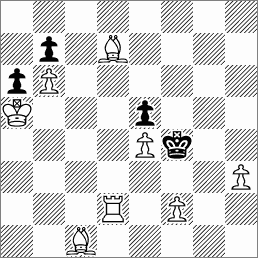
Show Solution1.Bg4 ! (2.Rd4/Re2#)
1...Kxe4 2.h4 Kf4 3.Rd4#
1...Kg5 2.Rd6+ Kh4 3.Rh6#
Charles William Benbow (13-02-1842 - 09-03-1908) New Zealander composer
Benbow is quoted in "English Chess Problems" (1876). He composed difficult problems, even for our days:
Benbow, Charles William
English Chess Problems, 1876
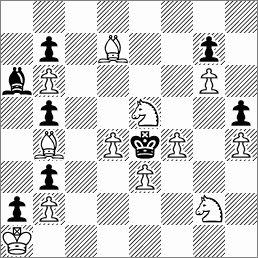
Show Solution1.Bc8 ! ZZ
1...Kd5 2.Bh3 Ke4 3.f5 Kd5 4.Sf4+ Ke4 5.Sd5 Kxd5 6.Bg2#
William Henry Lyons (13-02-1849 - 01-10-1932) American composer
W.H. Lyons composed, probably unknowingly, the problem that presents the precursor of the
Lacny theme:
Lyons, William Henry
Bolton Football Field, 1897
1
st Prize
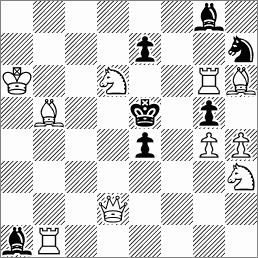
Show SolutionSet play:
1...Sf8 2.Bg7#
1...exd6 2.Qxd6#
1...e6/Bc4 2.Sc4#
1...Bf7 2.Sxf7#
1...gxh4 2.Bf4#
1.Rb4? (2.Rxe4#)
1...Bd4[a] 2.Qxd4#[A]
1...Bd5[b] 2.Qh2#[B]
1...exd6 2.Qxd6#
1...Bc4 2.Sxc4#
but 1...Sf6!
1.Bc4! ZZ
1...Bd4[a] 2.Qh2#[B]
1...Bd5[b] 2.Qxd5#[C]
1...Sf6 2.Rxg5#
1...Sf8 2.Bg7#
1...Bb2 2.Qxb2#
1...Bc3 2.Qxc3#
1...Bf7 2.Sxf7#
1...Be6 2.Rxe6#
1...Bxc4+ 2.Sxc4#
1...exd6 2.Qxd6#
1...e6 2.Rb5#
1...gxh4 2.Bf4#
1...e3 2.Qxe3#
(Nikolay Ivanovich Maksimov)
Maksimov's style seems influenced by the British school and he did have some success.
This problem deserves a glance, but the following is more elegant:
Максимов, Николай Иванович
Barmen Chess Club, 1905
3
rd Prize
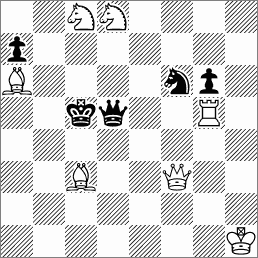
Show Solution1.Be1! ZZ
1...Kd4 2.Bf2#
1...Qe5/Qf5/Qxg5 2.Se6#
1...S~ 2.Rxd5#/Qxd5#
1...Se4 2.Qe3#
Black correction (bS), flight-giving key.
G. Arnaud Comte de Savignac-Castelet (13-02-1894 - 13-02-1970) French composer
An unexpected author: the following twomover shows 2 changed mates with a surprising key.
Comte De Savignac-Castelet, G. Arnaud
Bulletin de la Fédération Française des Échecs, 1928
Special Prize
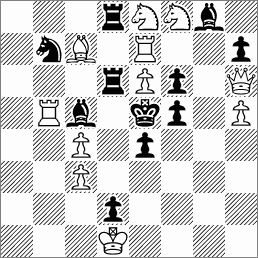
Show SolutionSet play:
1...e3[a] 2.Qxe3#[A]
1...f4[b] 2.Qxf6#[B]
1...Bf7 2.exf7#
1...Bxe6 2.Rxe6#
1...Rd7/Rc8/Rb8/Ra8/Rxe8 2.Sxd7#[C]
1...Sa5 2.Rxc5#[D]
1.Bb8? ZZ but 1...Rxb8!
1.Qg5? ZZ but 1...fxg5!
1.Qe3[A]? ZZ but 1...f4[b]!
1.Sxd6? (2.Sf7#) but 1...f4[b]!
1.Ra5? ZZ but 1...Sxa5!
1.Qxd2! ZZ
1...e3[a] 2.Qd4#[F]
1...f4[b] 2.Qd5#[E]
1...Bf7 2.exf7#
1...Bxe6 2.Rxe6#
1...Rd7/Rc8/Rb8/Ra8/Rxe8 2.Sxd7#[C]
1...Sa5 2.Rxc5#[D]
1...h6 2.Sg6#
Two
changed mates (
Pelle moves!) with an excellent key.
Comte De Savignac-Castelet, G. Arnaud
L'Échiquier Marseillais, 1925
3
rd Prize

Show SolutionSet play:
1...Ka4/b6 2.Qb4#/Qa3#
1...Bxb5+ 2.Qxb5#
1.Qe5! ZZ
1...Ka4/b6 2.Qa1#
1...Kb6 2.Qc7#
1...Bxb5+ 2.Qxb5#
A nice mutate in miniature.
Joseph Goldschmidt
[Thanks to Alain Pallier] |
Goldschmidt was a prolific composer. His most famous work, selected in the FIDE Album, is the following:
Goldschmidt, Joseph
Weisberg-Memorial, 1950
Prize
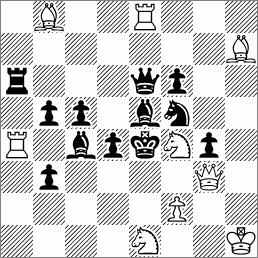
Show SolutionSet play:
1...d3/Bd3/Be2/Bf1/Bd5 2.Qe3#
1...Bxf4 2.Qg2#
1.Sd5! (2.Qg2#)
1...d3 2.Qxd3#
1...Be2/Bf1 2.Sc3#
1...Bxd5 2.Qe3#
1...Qxd5 2.Qxg4#
1...Bxg3/Bd6/Bc7/Bxb8 2.Sxf6#
Two black half-pins are exploited by the solution.
(Pavel Efimovich Neunyvako)
Neunyvako worked for the Red Army. He was arrested in 1938, convicted and executed in 1940 and rehabilitated posthumously in 1963 (
source).
Some of his problems were selected in the FIDE Album, among which the following twomover:
Неунывако, Павел Ефимович
Hamburger Volkszeitung, 1929
1
st Prize
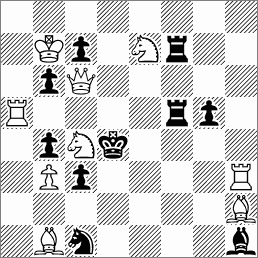
Show SolutionSet play:
1...Rf3[a] 2.Be5#/Qd5#/Qe4#[A]/Qd7#/Rd5#
1...Bf3[b] 2.Bg1#[B]
1...Be4[c] 2.Qxe4#[A]
1...Sd3/Se2/Sxb3/Sa2 2.Rxd3#
1...Rg7/Rh7 2.Sxf5#
1...Rf2/Rf1/R5f6/Re5 2.Be5#
1...Bxc6+ 2.Sxc6#
1.Rf3? (2.Bg1#[B]/Qe4#[A])
1...Rxf3[a] 2.Be5#/Qd5#/Qe4#[A]/Qd7#/Rd5#
1...c2/Rb5/Rxa5/bxa5/b5/Bxf3[b] 2.Bg1#[B]
1...Sd3 2.Rxd3#
1...Se2 2.Rd3#/Qe4#[A]
1...Rf4 2.Bg1#[B]/Qd5#/Qd7#/Rd5#
1...Re5 2.Bxe5#
1...Rd5 2.Bg1#[B]/Rxd5#/Qxd5#
but 1...Rxe7!
1.Sa3[C]! (2.Sc2#)
1...Be4[c]/Rf3[a] 2.Qxe4#[A]
1...Bf3[b] 2.Bg1#[B]
1...bxa3 2.Ra4#
1...Bd5 2.Sb5#
1...Bxc6+ 2.Sxc6#
1...Rf2 2.Be5#/Sb5#
1...Rd5 2.Qc4#
Barulin and
Grimshaw themes are doubled (d5 and f3).
Rudenko theme.
Composes occasionally.
Katreniak, Vojtech
Smena (Bratislava) 15
th Aug 1959 (14)
1
st Honorable Mention
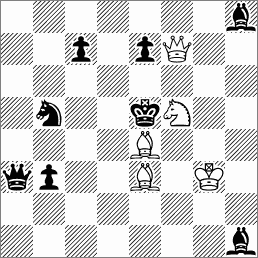
Show Solution1.Sd6! (2.Qxe7#)
1...Kxd6/Bf6 2.Qd5#
1...Qxd6 2.Qf5#
1...Sd4 2.Bf4#
1...e6 2.Qf4#
1...Bxe4 2.Sc4#
5 variations with self-blocks.
Artur Mayer (13-02-1916 - 16-01-1996) German composer
What a long career ! Artur Mayer composed
in 1931 (!) a problem in collaboration with T.R. Dawson. 63 years later, he published the following moremover:
Mayer, Artur
Neue Osnabrücker Zeitung, 1994
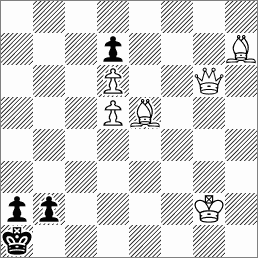
Show Solution1.Qe6 ! ZZ
1...dxe6 2.d7 exd5 3.d8=R d4 4.Rxd4 ~ 5.Rd1#
Zdeněk Meergans (13-02-1920 - 06-03-2012) Czech composer
Meergans is famous for his long helpmates, for instance this one:
Meergans, Zdeněk
Schach, 1983
1
st Prize
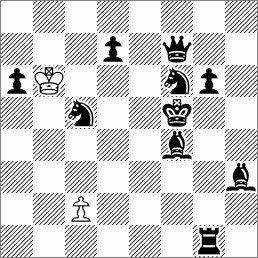
Show Solution1. Sd3 cxd3 2. Rg5 Kc5 3. Se4+ Kd4 4. Qf6+ Kd5 5. Bg4 dxe4#
1. Qd5 c4 2. Se6 c5 3. Ke5 c6 4. Kd6 c7 5. Be5 c8=S#
1. Se6 c4 2. Sd5+ cxd5 3. Kf6 dxe6 4. Ke7 exf7 5. Kd8 f8=Q#
Helga Hagedorn (13-02-1921 - 14-03-2007) German composer
Helga Hagedorn composed very rarely and usually in collaboration with Sorokin. She also translated
Botvinnik's Memoirs into German
(Thank you Dr. Dowd!)
Залокоцький, Роман Федорович & Hagedorn, Helga & Сорокин, Евгений Павлович
Canadian Chess Chat, 1981
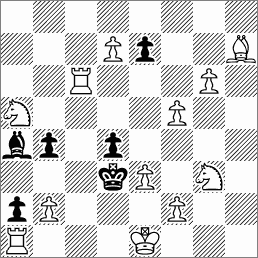
Show Solution1.g7! (2.f6#)
1...Bxc6 2.O-O-O#
1...e5 2.fxe6 e.p.#
1...dxe3 2.d8Q#/d8R#
Valladao task.
Michael Lipton (13-02-1937 - 01-04-2023) British composer and International Master
Michael Lipton
[Source: M. McDowell]
|
Michael Lipton is another living legend of British chess composition, together with Barry Barnes and John Rice.
According to
Michael McDowell's words on MatPlus Forum:
"Michael's first problems were published in 1951, and he gained the International Master of Composition title in 1976. He was a frequent contributor to The Problemist and served as BCPS President from 1999 to 2001. His complete output up to 2021 can be downloaded from the BCPS website. Away from chess Michael had a distinguished career as an economist."
There is ample choice for selection in his problems, so let's start with one twomover that did not make it into the FIDE Album, although it was a ground-breaking work:
Lipton, Michael
problem (Zagreb) 1960 (1539)
Comm.

Show Solution1.Se5? ZZ
1...Rxc3[b] 2.Rxe4#[G]
1...Rxe3[c] 2.Rxc4#[J]
1...Kxe3 2.Qc5#/Bb6#[B]
but 1...Kxc3[a]!
(Other tries eliminated)
1.Sd6! ZZ
1...Kxc3[a] 2.Qf6#[C]
1...Rxc3[b] 2.Sf5#[I]
1...Rxe3[c] 2.Sb5#[K]
1...Kc5[d] 2.Rxc4#[J]
1...Ke5[e] 2.Rxe4#[G]
1...Kxe3 2.Bb6#[B]
The first problem to combine a correct
Zagoruyko (after 1...Rxc3 and 1...Rxe3) with a complete
Rukhlis (same moves between try and post-key play and 1...Ke5, Kc5 post-key)".
Lipton, Michael
British Chess Problem Society, 1955
1
st Prize
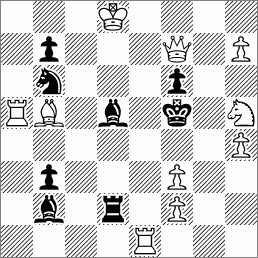
Show SolutionSet play:
1...Sc4/Sc8/Sd7/Sa4/Sa8/Be4+/Bxf3+[a]/Bc4+ 2.Bd7#[C]
1...Rd3/Rc2/Rxf2/Be6+/Bxf7+[b]/Bc6+ 2.Bxd3#[A]
1...Rd4/Bc1/Ba3 2.Qxf6#[B]
1.h8Q? (2.Qhh7#/Qfh7#) but 1...Re2!
1.Qg7? (2.Qg4#) but 1...Re2!
1.Rg1! (2.Rg5#)
1...Bxf3+[a]/Be6+/Bc6+ 2.Bd3#[A]
1...Be4+/Bxf7+[b]/Bc4+ 2.Bd7#[C]
1...Ke5 2.Qxf6#[B]
Exchanged mates between set play and real play after 1...Bxf3+/Bxf7+. Crossed-checks.
This one was selected in the FIDE Album. It was also award 1
st Prize at the McWilliam Tourney, 1956.
Lipton, Michael & Rice, John Michael
StrateGems, 2000
1
st Prize
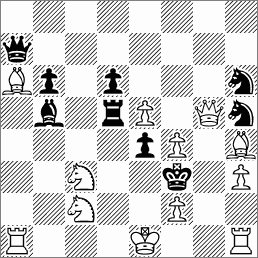
Show Solution1.f5 ! (2.Qe3+ Kg2 3.Qxe4#)
1...Bd3 2.0-0-0 (3.Se1#) 2...Bxc2 3.Be2# or 2...Sg3 3.Qxg3#
1...Rd3 2.0-0 (2.Se1#) 2...Rd1, Rxc3 3.Qe3, Sd4#
1...Rd1+ 2.Kxd1 Be2+, Sg3, dxe5 3.Bxe2, Qxg3, Se1#
Combines
Grimshaw with both white castles.
Andris Voldemarovich Virtmanis (13-02-1945) Latvian composer
Virtmanis mostly composes orthodox problems.
Virtmanis, Andris
Šachové umění 1983
1
st HM
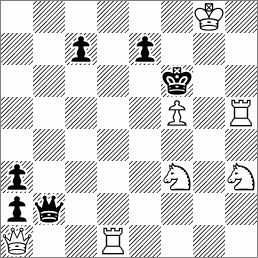
Show Solution1.Rd4 ! (2.Rh6+ Kxf5 3.Rf4#)
1...Qxd4 2.Qxd4+ e5 3.Qxe5/Qd8/Qh4#
1...Qb8+ 2.Rd8+ e5, Qb2 3.Qxe5, Rf8#
1...Qb3+ 2.Rd5+ Qb2/Qc3, e5 3.Rh6, Qxe5#
1...Qg2+ 2.Rg4+ Qb2,e5 3.Rg6,Qxe5#
Nicolae Micu (13-02-1939) Romanian composer and FIDE Master
 |
Leopold Mozeş
[Source: Miniaturi în alb şi negru, Virgil Nestorescu 2010] |
Nicolae Micu is an endgame studies composer who sometimes ventured into the helpmate field. One of his most famous works was elected
Study of the Year 1989:
Micu, Nicolae
Shakhmaty v SSSR, 1989
2
nd/3
rd Prize
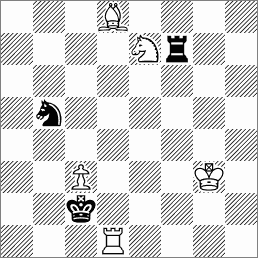
Show Solution1.c4 Sa3 2.Rd4 Kc3 3.Sc6 Rg7+
{3...Sxc4 4.Rxc4 Kxc4 5.Se5+}
4.Kf4
{4.Kf3? Sxc4 5.Bf6 Rf7 6.Rxc4 Kxc4 7.Se5+ Kd5 8.Sxf7 Ke6}
4...Sxc4 5.Bf6 Rg2
{5...Rf7 6.Kg5 Kb3 7.Rxc4 +-}
6.Kf3 Rd2
{6...Rg6 7.Rxc4+. Or 6...Ra2 7.Rd8+ Kb3 8.Rb8+! Ka3 9.Be7+ and 10.Rb4+ wins}
7.Rd3+ Kxd3 8.Sb4#
but unfortunately cooked by 1.Rh1!
Another study was commented by J.D. Beasley in
BESN 29:
Micu, Nicolae
The Problemist, 2000
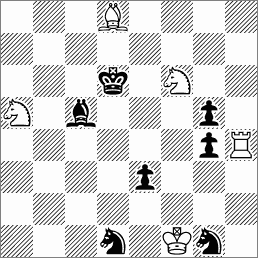
Show SolutionJohn D. Beasley's comments:
1.Se4+ Ke5
{1...Kd5 2.Rxg4 e2+ 3.Ke1 Se3 4.Sc3+ Ke6 5.Rxg1 Sc2+ 6.Kd2 Bxg1 7.Sxe2 Kd7 8.Bf6 Ke6 9.Bb2}
2.Rxg4 Kf5
{2...e2+ 3.Kc1 Se3 4.Sc4+ Sxc4 5.Sxc5 or 4...Kf5 5.Sxc3+ Bxe3 6.Sf6 Bd4 7.Rg3 Bc5 8.Sd5}
3.Rxg1
{3.Rxg5+ Kxe4 4.Rxc5 e2+ 5.Ke1 Sb2}
3...e2+ 4.Ke1 Bxg1 5.Sg3+ Ke6 6.Sxe2 Kd7 7.Bf6 Ke6 8.Bg7!
{Now comes the key try 8.Bh8? Bh2 9.Kxd1 Be5 10.Sd4+ Kd5. Similarly if 9.Sc4 Kd5 10.Sb6+ Kc6 11.Bd4 Sb2. Equally 8.Ba1 fails to win after 8...Se3 9.Sxg1 Sc2+ On we go with the duel:}
8...Kf7 9.Bh8 (9 Be5?) Kg8 (9...Bb6) 10.Bf6 Kf7 11.Bd8 Ke8 12.Bc7 (12.Sb7? Sf2) Kd7 13.Bb8 Kc8 14.Bd6 Kd7 15.Bf8 (15 Ba3(b4) Se3) Ke8 and now 16.Bh6 wins. A tour de force.









Helga Hagedorn also translated Botvinnik's Memoirs:
ReplyDeletehttp://www.amazon.de/Schach-Erinnerungen-Michail-M-Botwinnik/dp/3791901966
This mention has now been added to the post. Thank you!
Delete